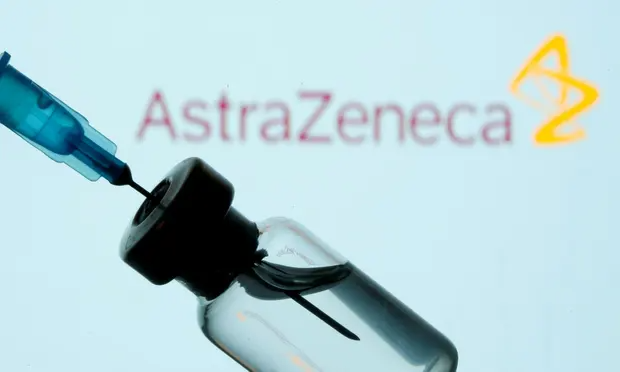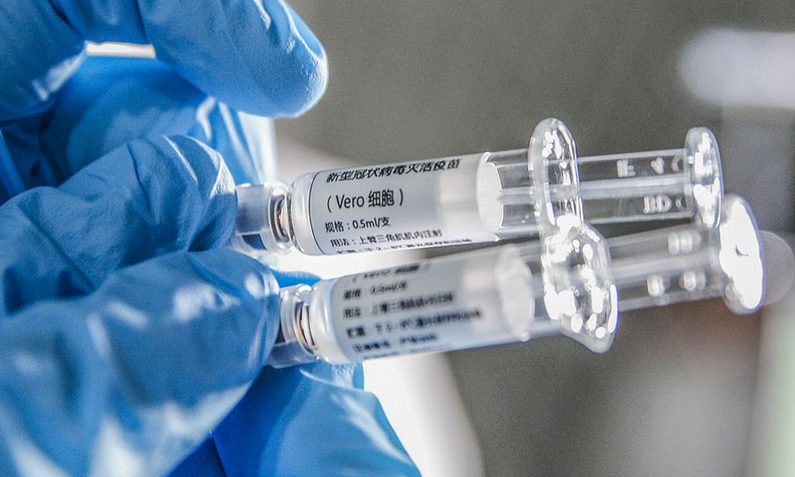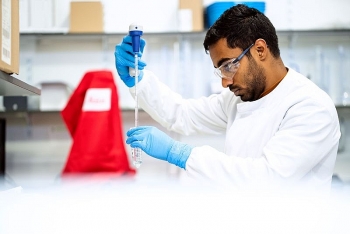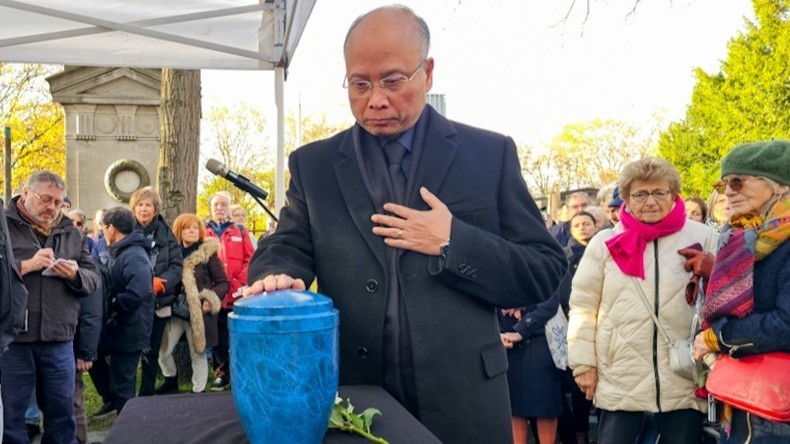Amid shortage of Coronavirus vaccines supplies, French and Germany threat legal action against AstraZeneca
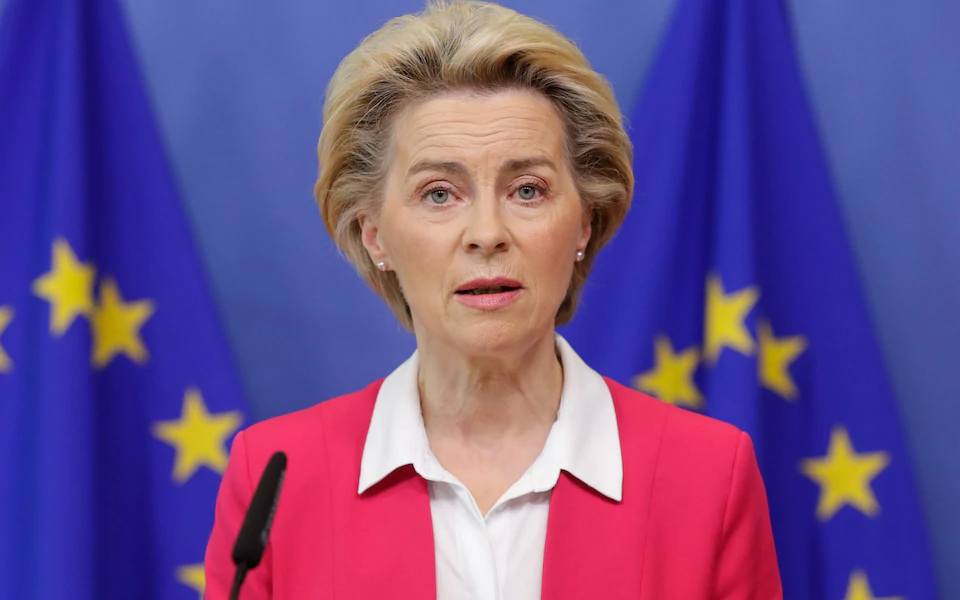 |
| European Commission President Ursula Von Der Leyen CREDIT: AFP/AFP |
EU officials in Brussels have spoken of their suspicions that a shortfall in deliveries of the Oxford/AstraZeneca vaccine may have been due to doses being diverted from plants in Belgium and the Netherlands to the UK.
The European commission is demanding that AstraZeneca provide the EU doses from its two plants in Oxford and Staffordshire, warning that the company was contractually obliged to fulfil its advanced purchase agreement.
Clement Beaune, the French Europe minister, threatened sanctions against the Anglo-Swedish firm, which produces the Oxford vaccine, if it emerged that Britain had been given priority.
"If there is a problem and that other countries have been favoured - for example the UK over us - then we will defend our interests," Mr Beaune said on Sunday. "Contracts are not moral commitments, they are legal commitments. Penalties or sanctions can be triggered in every contract."
It came as Berlin and Rome issued similar threats to vaccine providers, in the latest stage of a bitter row in Europe over delays in the production and delivery of Covid jabs. "If we find out that individual companies are not maintaining their side of the bargain then we'll have to make a decision on legal measures," Peter Altmaier, the German economy minister, told Die Welt newspaper, The Telegraph reported.
Mr Altmaier, a close confidant of Chancellor Angela Merkel, also warned vaccine producers that "it is in no way acceptable that another country is retrospectively favoured over the EU."
But on Sunday, Belgium’s prime minister, Alexander De Croo, said an initial inspection at AstraZeneca’s plant in Seneffe, 25 miles south of Brussels, had found evidence to back up the company’s claims of production issues at the site.
He said, however, that the investigation was continuing to ensure that the problems, described as a shortage of raw materials, were not a result of AstraZeneca allegedly favouring the UK’s order for 100m doses.
De Croo said: “AstraZeneca pointed to production issues at Seneffe. The federal medicines and health products agency has together with its European partners carried out checks at the site.
“It appears that there is a shortage of the raw materials needed to make the vaccines. The analysis of the situation there is still ongoing.
“Is it a typical production problem caused by having to very greatly increase production in a short time or is the problem due to others having been given precedence?”
De Croo said the commission’s new export authorisation system for vaccine suppliers gave the government a means to hit back but that he did not expect it to happen. “At first glance, that won’t be necessary,” he said.
“I hope that this won’t be necessary, and I don’t think that it is necessary,” De Croo added. “I presume that everyone is working with the best of intentions. However, if it becomes evident that the contract is not being respected, we have the means to hit back.”
AstraZeneca says it will deliver 4.6 million doses to France by the end of March, which is half the amount that was initially agreed upon. It has also significantly reduced its delivery targets for the EU for the first quarter of the year, leading to a furious response from Brussels, which accuses the company of offering preferential treatment to the UK.
Among the sanctions being considered by France include withholding payments, cancelling subsequent orders and seeking compensation for a breach of contract. Mr Beaune said an investigation into vaccine deliveries to Britain by EU-based factories was already underway.
The continued assurance to the UK government that its doses would be delivered on time infuriated officials in Brussels who insisted that the sites in Britain should be used to meet the EU’s order.
In response, the Anglo-Swedish company’s chief executive, Pascal Soriot, said last week that this was not in the advance purchase agreement.
He insisted the company was obliged only to make “best efforts” to deliver doses “more or less at the same time as the UK” as the EU contract had been signed three months later.
Clément Beaune, France’s Europe minister, said on Saturday that the EU was investigating, but that the company could face “penalties or sanctions” if found to have given priority to British orders of the vaccine.
French resists calls to impose a third lockdown
As the third wave of coronavirus spreads across the continent, Emmanuel Macron, the French president, is resisting calls to impose a third lockdown and has instead tightened existing restrictions.
"When you're French, you have everything you need to succeed providing you dare to try," he is said to have told ministers on Friday, though the refusal to declare a full lockdown went against his own scientific advisers' recommendations.
Polish police launched tear gas and stun grenades over the weekend as they shut down illegal discos and parties in the cities of Wroclaw and Rybnik. As in other European cities, some businesses have opened for trade in defiance of the rules while protests over Covid restrictions have broken out in the Netherlands, Spain, France and Denmark.
Dutch police arrested at least 30 people in Amsterdam on Sunday as they struggled to prevent a fresh outbreak of anti-lockdown rioting. Thousands of protesters also took to the streets of Vienna over the weekend, taking part in an anti-lockdown demonstration organised by a far-Right group.
Similar scenes unfolded in Hungary where a group of 100 restaurants said they would reopen despite facing threats of heavy government fines.
It also emerged over the weekend that Boris Johnson forced the EU into making two u-turns on vaccines after Brussels tried to prevent doses in a Belgian factory from reaching the UK, and moved to impose a hard border in Northern Ireland for the same purpose.
During two phone calls with Ursula von der Leyen, the president of the European Commission, Mr Johnson is said to have persuaded the EU chief to abandon both proposals, the Mail on Sunday reported. Michael Martin, the Irish prime minister, told the BBC on Sunday that they were "blindsided" by the EU threat to seal off the frontier.
"The problem is the commission took the wrong mechanism in revoking Article 16 of the protocol to deal with it," he said, adding that there were "a lot of lessons to be learned" over vaccine supplies.
On Sunday night, Ms von der Leyen announced on Twitter that the EU would ramp up vaccine supplies this week.
"[AstraZeneca] will deliver 9 million additional doses in the first quarter (40 million in total) compared to last week’s offer & will start deliveries one week earlier than scheduled. The company will also expand its manufacturing capacity in Europe," she wrote.
Which European countries are being hit the hardest?
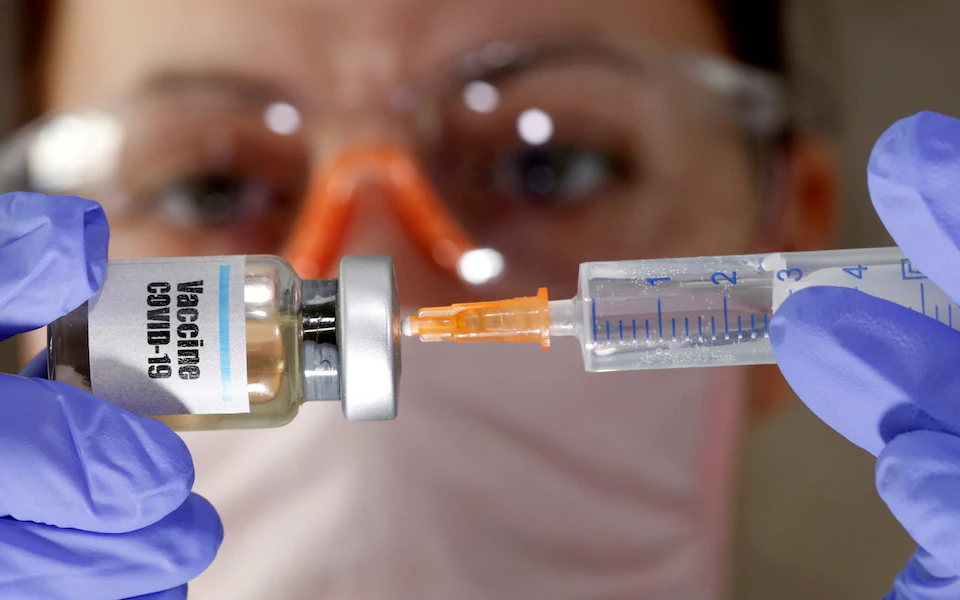 |
| A woman holds a small bottle labeled with a "Vaccine COVID-19" sticker and a medical syringe CREDIT: Reuters/Reuters |
In a sign that Brussels wants to dial down the rhetoric in the row, the EU’s ambassador to the UK, João Vale de Almeida, emphasised that the EU was not in dispute with the UK. “Our enemy is the virus,” he said. “Our contractual issues are with the vaccine producers. Britain is an ally of ours in the fight against Covid.”
The EU commission president, Ursula von der Leyen, said on Sunday AstraZeneca will deliver 9m additional Covid-19 vaccine doses in the first quarter, making a total of 40m doses to Europe.
AstraZeneca will start deliveries one week earlier than scheduled, Von Der Leyen said on Twitter. “The company will also expand its manufacturing capacity in Europe,” she said.
Speaking on German television later that evening, she rejected suggestions that Europe was in a race to vaccinate its population against the coronavirus faster than other countries, saying that it was important to cooperate at this stage of the pandemic.
“I think the only race we are in is with the virus and against time,” Von der Leyen said, adding that she had enjoyed “a very good conversation with Boris Johnson” the previous night in which she and the prime minister had agreed that factories in both the UK and EU would deliver doses to each region.
The EU has been criticised for investing too little in scaling up manufacturing in the early months of the pandemic.
According to the data analytics company Airfinity, the EU spent just €1.78bn (£1.58bn) in “risk money”, cash handed to pharmaceutical companies without any guarantee of a return, compared with €1.9bn by the UK and €9bn by the US.
The EU has a €336m advance purchase agreement with AstraZeneca to provide 400m doses of which a quarter was due before the end of the March. EU officials involved in the contract said that not all of the money had been paid to the company, describing the amount held back as “not pennies, not cents”. It is believed to in the region of €110m.
Given the company disputes the commission’s reading of the contract, such a move would probably end up in the courts, an outcome accepted in the commission, with officials insisting they are sure of their case.
Asked if the EU could refuse to make the final payment to AstraZeneca, Beaune said: “Yes, for example … by not ordering supplementary doses, or the penalties all which have been foreseen by the contract. But if it’s an industrial glitch, that results in a reduction in deliveries for Europe and not for the others, that’s a problem.
“I don’t want suspicion, [or] conspiracy, but we need clarity and transparency. At the moment, there is an investigation that is in the process of being finalised to see precisely what was delivered in Europe and to the UK from factories that produce in Europe. If there has been a preference granted to the British, then that’s a problem.”
The EU has introduced an export authorisation scheme to force vaccine suppliers to seek agreement on any doses leaving the bloc. It has also demanded disclosure of the last three months of exports.
The EU has been hit by a lack of supply after Pfizer also reported production problems in its plant in Belgium. The latest figures show that the UK has vaccinated 13.1% of its adult population. The EU has given a vaccine shot to 2.69% of its adult population, with the rollout of first jabs suspended in Paris and Madrid, among other regions.
The European Medicines Agency on Friday approved the use in the EU of AstraZeneca’s vaccine for people over 18 without an age limit.
The vaccine’s developers and regulators in the UK have strongly defended its efficacy in all groups.
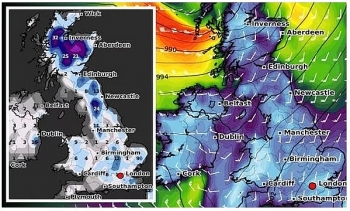 | UK and Europe daily weather forecast latest, January 31: Heavy snow to sweep Britain as a brutal Icelandic freeze strikes The UK is forecasted to brace for the coldest day of winter as a brutal -13C Icelandic freeze could dump 18 inch of snow. Meanwhile, ... |
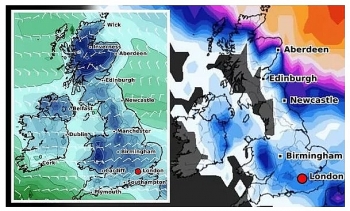 | UK and Europe daily weather forecast latest, January 30: Deep freeze and more unprecedented heavy snowfall to brace for Britain Britain is forecasted to cope with ferocious weather system over Greenland, which triggers a deep freeze and heavy snow in the UK. Meanwhile, cold conditions ... |
 | UNDP supports much-needed infrastructure improvements in Bac Lieu, Ca Mau The United Nations Development Program (UNDP), Bac Lieu Provincial People's Committee, and the Bac Lieu provincial Women's Union on January 28 held a ceremony to ... |
Recommended
 World
World
Pakistan NCRC report explores emerging child rights issues
 World
World
"India has right to defend herself against terror," says German Foreign Minister, endorses Op Sindoor
 World
World
‘We stand with India’: Japan, UAE back New Delhi over its global outreach against terror
 World
World
'Action Was Entirely Justifiable': Former US NSA John Bolton Backs India's Right After Pahalgam Attack
Popular article
 World
World
US, China Conclude Trade Talks with Positive Outcome
 World
World
Nifty, Sensex jumped more than 2% in opening as India-Pakistan tensions ease
 World
World
Easing of US-China Tariffs: Markets React Positively, Experts Remain Cautious
 World
World

